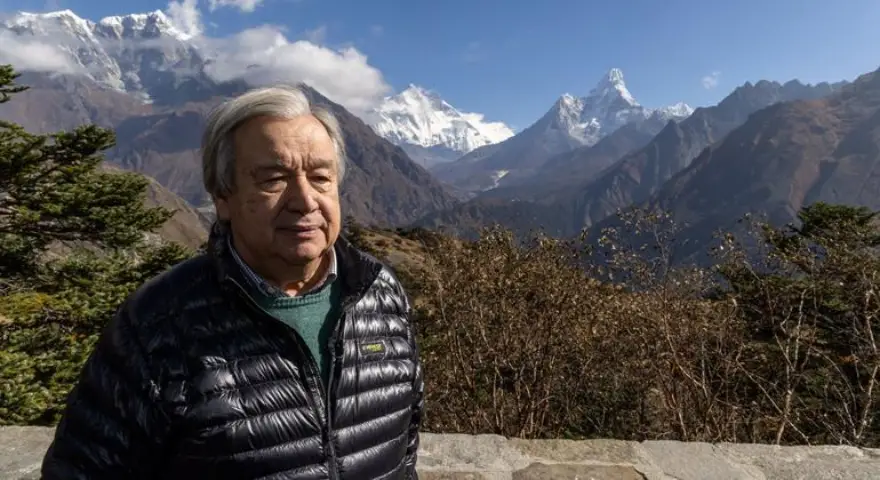Kathmandu: United Nations Secretary General Antonio Guterres reiterated his criticism of Israel over its relentless bombardment of Gaza, a Palestinian territory as he spoke at a press meet in Kathmandu on Sunday.
Despite facing criticism from the Israeli leaders and some western leaders over his earlier remark at the meeting of the Security Council on October 24 for alleged Palestine bias, Secretary General Guterres continued his criticism of Israeli bombardment of the Gaza strip, stating that it caused a humanitarian catastrophe.
The Gaza strip, a smaller Palestinian enclave, is being ruled by Hamas militants who attacked Israel on October 7, killing over 1,400 people and taking over 200 hostages from different countries, mostly Israelis. At least 10 Nepali students studying and working in Israel, lost their lives in Hamas attacks while one is still missing and several others were injured.
“The situation in Gaza is growing more desperate by the hours,” he said at a press meet in Kathmandu on Sunday. “I regret that instead of a critically needed humanitarian pause supported by the international community, Israel has intensified its military operations.”
Earlier, on October 21, United Nations General Assembly had adopted a resolution calling for an immediate, durable and sustained humanitarian truce between Israeli forces and Hamas militants. Nepal voted in favour of the resolution.
Unlike the resolution that is adopted by the UN Security Council, the resolution adopted by the General Assembly is non-binding but represents the voice of the international community.
Israel and Hamas have been at war since the militant group attacked Israeli security forces and civilians early October.
In retaliation, Israel has been bombarding the Gaza strip that has killed over 8,000 Palestanians, according to an Aljazeera report.
With Israel also blocking flow of the water, food and electricity, over two million people in Gaza are facing a humanitarian crisis, according to the UN.
Speaking in Kathmandu, UN Secretary Guterres said, “The world is witnessing a humanitarian catastrophe taking place before our eyes. More than two million people, with nowhere safe to go, are being denied the essentials for life – food, water, shelter and medical care – while being subjected to relentless bombardment.”
Urging all those with responsibility to step back from the brink, he called for an immediate humanitarian ceasefire, the unconditional release of all hostages, and the delivery of a sustained humanitarian relief at a scale that meets the needs of the people of Gaza. Despite harsh criticism of Israel, Guterres also condemned the ‘appalling attacks’ perpetrated by Hamas. “There is no justification, ever, for the killing, injuring and abduction of civilians,” he said.
During his speech on October 24, the UN chief had pointed out the context of Hamas attacks saying that attacks “didn’t happen in vacuum.”
“It is important to also recognize that the attacks by Hamas did not happen in a vacuum,” Guterres had remarked. “The Palestinian people have been subjected to 56 years of suffocating occupation. They have seen their land steadily devoured by settlements and plagued by violence; their economy stifled; their people displaced and their homes demolished. Their hopes for a political solution to their plight have been vanishing.”
Guterres’s comments, sparked outrage from Israel, whose ambassador to the UN, Gilad Erdan asked the UN boss to resign, accusing Guterres of justifying terrorism. Israel has since said it will refuse visas to UN officials.
However, it is not the first time that Israel and the UN are in loggerhead over the Palestine question. The two have had tricky relations over the last several decades with Israel expanding Jewish settlements in occupied Palestinian territories.
According to UN Watch, a non-governmental organisation in Geneva, the General Assembly passed 140 resolutions criticising Israel between 2015 and 2022 alone, condemning the construction of settlements and the annexation of the Golan Heights.
In the same time period, only 68 resolutions were passed concerning the rest of the world, for example 23 in the case of Russia, according to the UN Watch, which claims to be fighting anti-semitism and anti-Israel bias in the UN body.
The situation in the Palestinian territories has become the agenda of most of the meetings of the United Nations Human Rights Council these days.
Israel has long felt it is treated unjustly by the UN, and this has been reflected in its reaction to Guterres’s earlier remark.
The UN chief who is on a four-day visit since Sunday to Nepal was supposed to visit Nepal in early October but the crisis in West Asia forced him to postpone his earlier scheduled visit to the Himalayan country.
His prolonged stay in Nepal amid war in West Asia has also received mild criticism by some people on the social media in Nepal pointing out the grave situation in Gaza.
During his stay in Nepal,Guterres, held talks with Nepal’s President Ramchandra Paudel, Prime Minister Pushpa Kamal Dahal, Deputy Prime Minister and Minister for Defence Purna Bahadur Khadka and Foreign Minister NP Saud.
During those meetings, he discussed the issues including the transitional justice process in Nepal, which has been in limbo since 2006 following the end of civil war, effects of climate change, Nepal’s contribution to UN peacekeeping, and Nepal’s planned graduation from a least developed country in 2026.
At the press meet on Sunday, the UN Chief highlighted the dire impact of climate change in Nepal. On Monday, he visited Everest Base camp and left a video message on social media platform X previously twitter. “I am here in the Himalayas where glaciers are melting at record level…And, here we see floods. We see landslides. We see communities being dramatically impacted. We must stop this madness. We must make sure that we limit temperature rise to 1.5 degrees,” he said. “Glaciers are retreating. We cannot retreat. We must move forward with climate action.”
Also Read: Israel calls for resignation of UN chief over remarks on action in




















